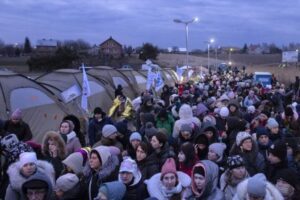
Early data estimates suggest that 90% of the Ukrainian population could be facing poverty and extreme economic vulnerability should the war deepen, setting the country – and the region – back decades and leaving deep social and economic scars for generations to come, according to the early projection released today by the United Nations Development Programme (UNDP).
“In the event of a continuing, protracted war in Ukraine, 18 years of socio-economic achievements could be lost, with almost one third of the population living below the poverty line and a further 62% at high risk of falling into poverty within the next twelve months, according to an early projection released today by the UNDP,” UNDP said in a press release on Wednesday.
UNDP Administrator Achim Steiner said that the war in Ukraine is causing unimaginable human suffering with a tragic loss of life and the displacement of millions of people.
“While the need for immediate humanitarian assistance to Ukrainians is of the utmost importance, the acute development impacts of a protracted war are now becoming more apparent. An alarming economic decline, and the suffering and hardship it will bring to an already traumatized population must now come into sharper focus. There is still time to halt this grim trajectory,” he said.
Based on its longstanding, trusted partnership with the Government of Ukraine, UNDP has been working in all 24 regions (administrative districts) of Ukraine with more than 332 municipalities, 15 civil society organizations hubs, and more than 17 business membership associations across the country. As part of the coordinated United Nations Country Team’s response, UNDP is now leveraging this extensive network for immediate and scaled up support to the people of Ukraine, focusing on immediate crisis response and maintaining core government functions for emergency response management and public service delivery.
“In order to avoid further suffering, destruction and impoverishment we need peace now. As part of the United Nations’ unwavering commitment to the Ukrainian people, UNDP’s primary focus is to help preserve hard-won development gains. That includes supporting the government to sustain critical governance structures and services, which constitute the bedrock of all societies,” Steiner said.
UNDP said that according to government estimates, at least $100 billion worth of infrastructure, buildings, roads, bridges, hospitals, schools, and other physical assets have been destroyed. The war has caused 50% of Ukrainian businesses to shut down completely, while the other half are forced to operate well below capacity.
Among the largest UN agencies on the ground in Ukraine, UNDP has remained operational throughout the conflict and is now boosting its presence with targeted, specialized deployments in key areas such as debris management, damage assessment and emergency livelihoods including cash-based assistance, and also offering operational entry points and platforms to development and humanitarian partners to channel and scale support to the Government and people of Ukraine.
UNDP said that a series of policy measures in the coming weeks could assist and mitigate a freefall into poverty as the conflict rages on. In view of the scale of the needs and priorities, and of the country’s strong banking and financial services infrastructure, UNDP joins the UN Crisis Coordinator in promoting the use of multi-purpose cash assistance which could help reach the largest number of people in desperate need across the country.
“For example, UNDP’s initial estimates are that a large-scale emergency cash transfer operation, costing approximately $250 million per month, would cover partial income losses for 2.6 million people expected to fall into poverty. A more ambitious temporary basic income (TBI) that provides a basic income of $5.50 per day per person would cost $430 million a month, based on initial estimates,” the organization said.

The Office of the UN High Commissioner for Human Rights (OHCHR) has documented 1,834 civilian casualties (1,761 a day before) in the country, including 691 (636) killed (from February 24 when the Russia invaded Ukraine to 24:00 midnight on March 14, 2022 (local time).
“OHCHR believes that the actual figures are considerably higher, especially in Government-controlled territory and especially in recent days, as the receipt of information from some locations where intense hostilities have been going on has been delayed and many reports are still pending corroboration,” the UN said in the document.
According to him, this applies, for example, to Izium (Kharkiv region), and Mariupol and Volnovakha (Donetsk region) where there are allegations of hundreds of civilian casualties. These figures are being further corroborated and are not included in the above statistics.
“Most of the civilian casualties recorded were caused by the use of explosive weapons with a wide impact area, including shelling from heavy artillery and multi-launch rocket systems, and missile and air strikes,” the UN said in the report.
According to confirmed UN data, some 135 men, some 99 women, 11 boys and seven girls killed, while the sex of 30 children and 409 adults has not yet been known.
Among the 1,143 injured, some15 girls and four boys, as well as 43 children, whose sex is yet unknown.
Compared to the previous day, two children were killed, according to the UN.
OHCHR said that in Donetsk and Luhansk regions, as of midnight March 15, there were 134 (122) dead and 448 (442) injured in government-controlled territory, and 39 (26) dead and 130 (130) injured in territory controlled by self-proclaimed “republics.”
In other regions of Ukraine under government control (Kyiv, as well as in Zhytomyr, Zaporizhia, Kyiv, Sumy, Odesa, Mykolaiv, Kharkiv, Kherson, Dnipropetrovsk, Cherkasy and Chernihiv regions), the UN recorded 518 (488) killed and 565 (553) wounded.
OHCHR notes the report of the Ukrainian Parliament Commissioner for Human Rights, according to which as of 10 a.m. (local time) 15 March, 97 children had been killed and more than 100 injured.
The increase in the figures in this report compared to the figures in the previous report should not be attributed only to new cases that occurred on March 13, since OHCHR also verified a number of cases that occurred in previous days during the day, according to the document.

Russia’s military offensive against Ukraine forced 2.952 million people to leave the country in 19 incomplete days of the war in search of safety, protection and assistance, the Office of the United Nations High Commissioner for Refugees (UNHCR) said as of 13:00 (Kyiv time) on March 14.
The Office said the Ukrainian-Polish border accounted for 60.7% of all refugees.
According to the UNHCR, the number of refugees from Ukraine to Poland since February 24, when Russia started the war, has reached 1.791 million.
Romania received 453,430 people, of which 250,800 people were in transit through Moldova, the department said.
According to it, some 263,890 people arrived in Hungary, some 213,000 in Slovakia, some 86,380 in Moldova.
According to the UNHCR, the flow of refugees from Ukraine to Russia amounted to 142,990, to Belarus (data for March 13) some 1,230.
“As the situation continues to evolve, about 4 million people may leave Ukraine,” the UNHCR said.
According to its estimation two days ago, there are now at least 1.85 million internally displaced persons (IDPs) in Ukraine and another 12.65 million directly affected by the war.
UNHCR said that by the middle of 2021 there were 53,470 Ukrainian refugees in the world who applied for the appropriate status, of which 36,490 were in Europe.
As of the middle of 2020, the UNHCR estimated the Ukrainian diaspora in the world at 6.1 million, including 5 million in Europe.
The organization said the right to free movement within the Schengen area means that there are very few border controls in the European Union, so arrivals in Hungary, Poland and Slovakia only reflect border crossings in these countries, however, according to the UN, a large number of people moved to other countries.
In addition, UNHCR does not take into account persons from border countries who leave Ukraine and return home.